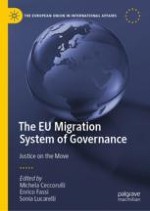2021 | OriginalPaper | Chapter
9. Germany’s ‘Atypical’ Leadership in the EU Migration System of Governance and its Normative Dimension
Author : Antonio Zotti
Published in: The EU Migration System of Governance
Publisher: Springer International Publishing
Activate our intelligent search to find suitable subject content or patents.
Select sections of text to find matching patents with Artificial Intelligence. powered by
Select sections of text to find additional relevant content using AI-assisted search. powered by
